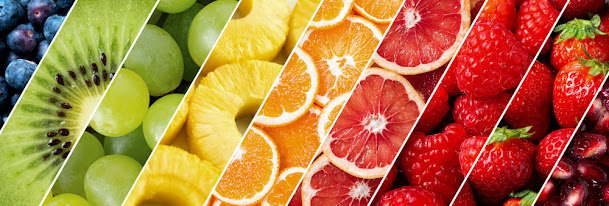The Nutritional Benefits of Eating Fruits and Vegetables: A Comprehensive Guide
Eating fruits and vegetables is one of the best things we can do for our health. Not only are they delicious, but they provide an abundance of essential nutrients, vitamins, and minerals. Fruits and vegetables are packed with antioxidants that help protect our bodies from the damage caused by free radicals. They also help to reduce inflammation, improve digestion, and even reduce the risk of cancer. With this comprehensive guide, you will learn more about the nutritional benefits of eating fruits and vegetables, as well as how to incorporate more of them into your diet.
Vitamins and
minerals found in fruits and vegetables
Fruits and vegetables are great sources of vitamins and minerals. The table sources list some of the most important vitamins and minerals found in fruits and vegetables. As you can see from the table above, fruits and vegetables contain all of the vitamins and minerals that humans need, which makes them a very nutritious food choice. However, there are some vitamins and minerals that are particularly abundant in fruits and vegetables, such as Vitamin C and beta-carotene.
Antioxidants in
fruits and vegetables
Antioxidants are substances found in Fruits and Vegetables Online in Chennai that help protect our bodies from the damage caused by free radicals. Free radicals are by-products of normal metabolic processes in our bodies and can cause damage to our tissues and DNA when they are not removed quickly enough. When they are not cleared efficiently, they can cause oxidative stress and have been linked to chronic diseases like heart disease, diabetes, and certain types of cancer. There are several different types of antioxidants. Some of the most common antioxidants in fruits and vegetables include carotenoids, flavonoids, and anthocyanin. These antioxidants are what give fruits and vegetables their red, yellow, and blue/purple colors.
Benefits of
eating fruits and colors
Fruits and vegetables provide an abundance of health benefits when they are
eaten as part of a balanced diet. These include: - Reduced risk of heart
disease - Eating fruits and vegetables has been shown to reduce the risk of
cardiovascular disease, the leading cause of death worldwide. - Reduced risk of
diabetes - According to a study published in the journal Diabetologia, consuming
about 3 servings of fruits and vegetables per day is associated with a reduced
risk of diabetes. - Improved digestive health - Eating fruits and vegetables is
associated with a reduced risk of certain digestive disorders, such as
constipation, indigestion, irritable bowel syndrome, and diverticulitis. -
Reduced risk of certain cancers - Studies have shown that a high intake of
fruits and vegetables is associated with a reduced risk of cancers of the
digestive tract, lungs, and bladder. - Improved mental health - Eating online vegetable shopping in Chennai
is
associated with a reduced risk of mental illnesses like depression, anxiety,
and cognitive decline. - Improved eye health - While fruits and vegetables are
packed with antioxidants that are good for the whole body, they are especially
good for the eyes. - Reduced risk of macular degeneration - Eating a high
amount of fruits and vegetables is associated with a reduced risk of macular
degeneration, the leading cause of blindness in older adults. - Healthy skin -
Eating a healthy diet that is rich in fruits and vegetables is also good for
your skin.
How to
incorporate more fruits and vegetables into your diet
If you are like most people, you already know that eating more fruits and vegetables is a good idea. Unfortunately, most people are not eating enough fruits and vegetables, and this can have negative health effects. If you want to get the most out of your diet, you should be eating at least 2 servings of fruits and vegetables per day. If you want to increase the number of buy fresh fruits online in Chennai in your diet, the number should be aware of certain factors that can make it easier. For example, it is better to eat your fruits and vegetables with every meal than to save them for a separate snack. It is also helpful to keep some fruits and vegetables on hand so that they are easy to grab when you are hungry.
The best fruits
and vegetables for a healthy diet
There is a lot of variation among different types of fruits and vegetables. While most fruits and vegetables are healthy, some are healthier than others. The table below lists the top 10 fruits and vegetables, ranked according to their nutritional value per serving. These rankings are based on several different factors, including the percentage of the daily value for the important vitamins and minerals, as well as the number of calories number serving. As you can see from the table above, the top fruits and vegetables are very different from each other. This illustrates that one of the best ways to get a healthy diet is to diversify your choices
The importance
of variety in a healthy diet
You might be wondering why some of the fruits and vegetables that are higher on the list are so low. Aren’t bananas and carrots healthier than watermelons and broccoli? The answer is that these fruits and vegetables are healthy, but they are not as healthy as watermelons and broccoli. Although bananas and carrots are healthy, broccoli is healthier. This doesn’t mean that bananas and carrots are unhealthy; they are nutritious foods that most people don’t eat enough of. However, broccoli provides a lot more vitamins and minerals than bananas or carrots. The best way to get a healthy diet is to eat a variety of fruits and vegetables, and not just the ones that are popular.
Tips
for increasing your intake of fruits and vegetables
If you’re not sure where to start when it comes to increasing your intake of fruits and vegetables, there are many ways that you can make it easier. The table below lists several ideas that can make it easier to add more fruits and vegetables to your diet. As you can see from the table above, there are both simple and more advanced ways to increase your intake of fruits and vegetables. Some of these ideas are more effective than others, with chewing being the most effective method. Swallowing a whole apple, carrot, or banana is far less effective, as you would have to chew them for a very long time to break them down enough to be absorbed.
Health risks
associated with too much sugar from fruits and vegetables
Fruits
and vegetables are very healthy, but some have more sugar than others. While
sugar is naturally present in many fruits, some vegetables also contain sugar.
For example, tomatoes and carrots are often used in savory dishes, but they are
also high in sugar. Some fruits and vegetables, like sweet potatoes and
butternuts, are low in sugar, while others, like bananas and grapefruits, are
high in sugar. Too much sugar from fruits and vegetables can negatively affect
your health. Excessive sugar intake can lead to obesity, diabetes, and
cavities. There are simple ways to reduce the sugar content in your fruits and
vegetables. For example, you can add spices like cinnamon, nutmeg, and cayenne
pepper to fruit dishes to reduce their sweetness. You can also pair sweet
vegetables with savory dishes to reduce their sweetness.
Conclusion
Eating
fruits and vegetables is one of the best things you can do for your health.
They are packed with antioxidants that help protect our bodies from the damage
caused by free radicals. They also help to reduce inflammation, improve
digestion, and even reduce the risk of cancer. With this guide, you will learn
more about the nutritional benefits of eating fruits and vegetables, as well as
how to incorporate more of them into your diet.


Comments
Post a Comment